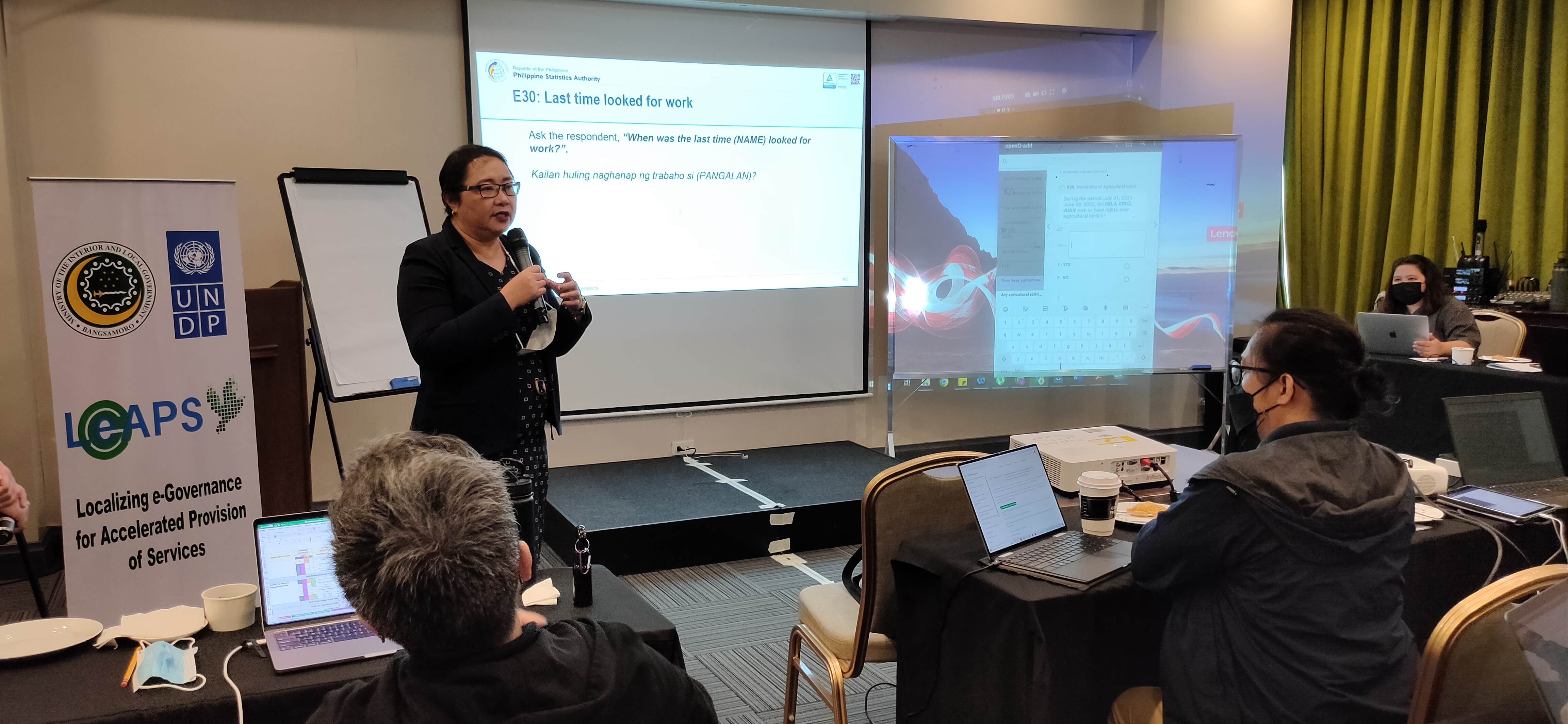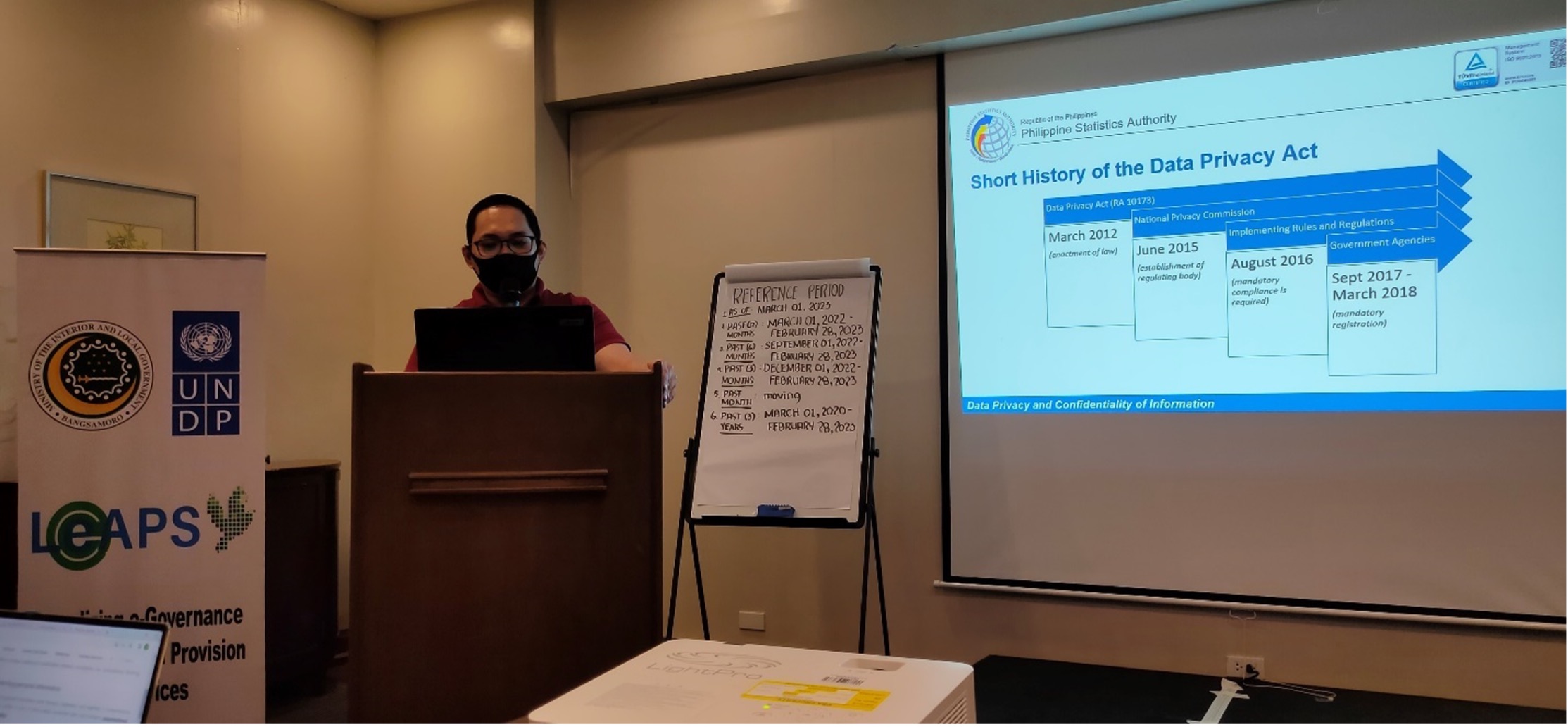PSA holds data collection training for BARMM digitalization program
January 25, 2023

PSA Assistant National Statistician and Officer-in-Charge of the Deputy National Statistician for Censuses and Technical Coordination Minerva Eloisa Esquivias talks about the CBMS questionnaires used on the ground
MAKATI CITY, Philippines – The Philippine Statistics Authority (PSA) Central Office, together with the United Nations Development Program (UNDP), conducted a Data Collection Training to fine-tune the implementation of the Development through Local Indicators and Vulnerability Exposure Database (DevLIVE+) project in the Bangsamoro Autonomous Region in Muslim Mindanao (BARMM) on 5-10 December 2022 in Makati City.
The training is a requirement to ensure the compliance and consistency of third-party implementers with PSA's standard protocols in the implementation of the Community-Based Monitoring System (CBMS) or Republic Act No. 11315. Participants of the training included DevLIVE+ consultants of the BARMM’s Ministry of the Interior and Local Government (MILG), UNDP, and civil society organization partner The Moropreneur Inc. (TMI).
Under the Localizing e-Governance for the Accelerated Provision of Services (LeAPS) Program, DevLIVE+ will be implemented in eight (8) select BARMM local government units (LGUs) using CBMS as a minimum indicator to generate the updated disaggregated data necessary in targeting beneficiaries, conducting more comprehensive poverty analysis and needs prioritization, designing appropriate policies and interventions, and monitoring impact over time.
Data for the good
According to Myraechelle Boling, trainer and Statistical Specialist I of the PSA, CBMS is unique because it reaches the respondents all the way to the barangay and family levels. “[It] is not just solely about measuring poverty based on income. It is seen in several directions such as health, education, and living standards, among others,” Boling said.
Minerva Eloisa Esquivias, PSA Assistant National Statistician and OIC-Deputy National Statistician for Censuses and Technical Coordination, also emphasized the importance of CBMS for evidenced-based local planning and for localized programming especially intended for social protection.
DevLIVE+ adapted and expanded the CBMS questionnaires, integrating additional survey elements and risk exposure database. The questionnaires were further enhanced to reflect the local context of BARMM. From the data gathered, policymakers will be able to execute data-driven decision-making for local policies, planning, and budgeting.

IN PHOTO: Atty. Carlo Mayo Antalan of PSA Central Office talks about the Data Privacy Act vis-à-vis the data acquired through the CBMS surveys.
Implementing CBMS in BARMM with UNDP and MILG
Some of the challenges anticipated in the rollout of CBMS through DevLIVE+ are in reaching geographically isolated areas in BARMM and getting the communities’ 100% participation. There may also be lingering problems in security and conflict. Boling recognized that the collaboration between MILG is instrumental in addressing these challenges. “With UNDP’s partnership with the MILG [through LeAPS], we will be able to empower the implementers and allow the penetration of CBMS in the far places of BARMM because MILG is a familiar entity to the people of Bangsamoro and [it] knows these areas,” Boling said.
The PSA thanked MILG and UNDP for spearheading the CBMS training and underscored the need for additional support to implement it in all the LGUs. Through the ongoing CBMS community validation that PSA is conducting, the importance of working with the communities to validate the information and the need for the data to be integrated with other information available in the LGUs for enhanced decision-making, is emphasized.
***
To be implemented in BARMM under the LeAPS Program, DevLIVE+ is a system and tool which will be used to collect, organize, visualize, and manage baseline data and information about households and other physical structures to make informed development planning, budgeting and policy-making towards sustainable and progressive communities.
LeAPS Program is a flagship program of MILG in partnership with UNDP which supports the Office of the Chief Minister, BARMM ministries, and LGUs by harnessing the transformative power of data, digitalization, and people-centered governance.

 Locations
Locations



